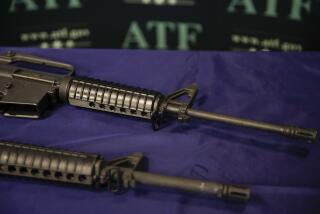Hahn Files Suit, Calls Car Seat ‘Potential Death Trap’
- Share via
Unsafe children’s car seats made in Taiwan have been sold to unsuspecting parents in Southern California over the past year, according to the Los Angeles city attorney’s office, which filed charges against the manufacturer and three local companies Monday.
The seats, which are stamped “Lin Lih Co. Ltd.” on the plastic shoulder strap holder, failed to meet federal safety standards in event of a collision or fire, officials said.
“In an accident, this seat would not be much better than no seat at all,” City Atty. James K. Hahn told a press conference Monday. “It’s not a safety device. It’s a potential death trap.”
About 2,300 of the car seats have been impounded and authorities are asking parents to turn in any such seats they might have bought and provide information as to where they were purchased. Officials said the seats were sold at stores and swap meets.
The seats, which are similar in appearance to some U.S.-made varieties, bear false labels claiming that they meet fire safety standards and were imported under false registry numbers, officials said.
“When we realized how badly designed the Lin Lih seat is, we had it crash-tested by the U.S. Department of Transportation and tested for flammability by the state Bureau of Home Furnishings,” Hahn said. “It failed both tests miserably.”
The investigation began last spring after a parent took one of the car seats into the Los Angeles Area Child Passenger Safety Assn. in Inglewood. The nonprofit association suspected the device was not safe, contacted police and helped investigate the case, officials said.
First Suit Against Foreign Firm
The suit filed Monday in Los Angeles Superior Court seeks civil penalties from four companies and three individuals for violating provisions of the California Business and Professions Code prohibiting illegal and unfair business practices and making false statements. This is the first time the city attorney’s office has filed suit against a foreign company, Hahn said.
The defendants are:
Lin Lih Baby Carriages Manufacturing Co. Ltd. of Taiwan; World Toys Discount Inc. of 204 East 3rd St. and its owner, Peter Loi; MCP Enterprises Inc. of 320 East 3rd St. and its former manager, Paul Hau, and Samco National Trading Inc., which owns the store El Payasito at 2437 W. Pico Blvd., and its owner, Samuel Taftian.
The manufacturer and World Toys Discount Inc. could not be reached for comment. Taftian said he was unaware that the car seats were illegal.
George Chun, assistant manager of MCP Enterprises, said: “They (the manufacturer) told us they had already applied for a permit from the U.S. government. . . . We didn’t know whether it was legal or illegal. . . . We just made a little silly mistake. We’re just like a newcomer in the U.S.”
Safe Seat for Same Price
He said his company has been in business here eight years and has sold 50 to 70 of the car seats.
Defendants face fines of $2,500 per violation, the city attorney said.
“The irony of this is that if you look around, you can find a sale and buy a safe car seat at the same price,” said Cheryl Kim, acting director of the Los Angeles Area Child Passenger Safety Assn.
The seats were selling for about $40, she said. Most U.S.-manufactured seats sell for about $50 to $60 and up.
Kim said the unsafe models can be identified by the shoulder straps, which are held in place by white plastic loops at the back, instead of metal loops. The armrest is a U-shaped tubular variety that flops up and down instead of being held down when the seat belt is fastened. Most varieties have been covered with gray, blue or maroon corduroy, she said.
Hahn said buyers who suspect that they have unsafe car seats should call the Child Passenger Safety Assn. at (213) 673-2666.
Hahn said his office is also seeking information about any children who might have been injured in the Lin Lih seats.
All children under the age of 4 or weighing less than 40 pounds are required by state law to travel in car seats that meet federal safety requirements.
More to Read
Sign up for Essential California
The most important California stories and recommendations in your inbox every morning.
You may occasionally receive promotional content from the Los Angeles Times.













